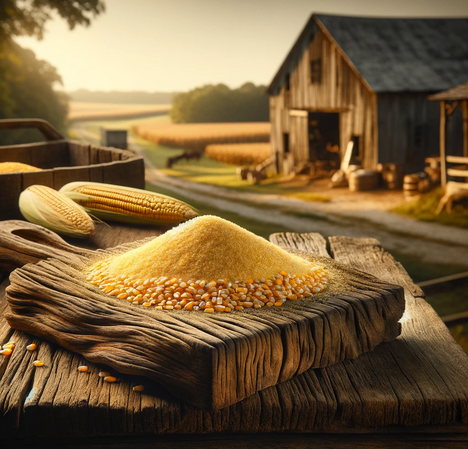Maize protein meal

In the world of dog nutrition, there are countless ingredients that receive both praise and criticism. One of these ingredients is corn protein meal, a by-product of corn processing that is used in many commercial dog foods. But what exactly is corn protein meal, and is it really good for our four-legged friend? This article dives deep into the topic, highlights the benefits and drawbacks and gives you a comprehensive understanding.
What is corn protein meal?
Corn protein meal is made from corn after the larger parts of the starch, sugar and oil have been removed. What remains is a protein-rich powder that is often used as an inexpensive source of protein in animal feed. It also contains a number of vitamins and minerals that can be beneficial to dogs' health.
Benefits of corn protein meal for dogs
An alternative source of protein
In a world where high-quality meat protein can sometimes be difficult to source or expensive, corn protein meal offers an alternative source of protein for dog food. It helps to meet a dog's protein requirements, which is essential for maintaining muscle mass, repairing cells and general bodily functions.
Rich in essential amino acids
Corn protein meal contains essential amino acids that dogs need for healthy growth. Although it does not provide all the essential amino acids in the amounts that meat does, it can contribute to overall nutrient intake.
Affordability and availability
The use of corn protein meal in dog food makes high-quality food more affordable for pet owners. Its wide availability also ensures a consistent supply, which can be especially valuable in times of meat shortages or rising prices.
Disadvantages and potential risks
Potential allergen
Corn and its derivatives, including corn protein meal, can cause allergies or intolerances in some dogs. Symptoms can range from skin problems to gastrointestinal disorders.
Lower biological value
The biological value of maize protein meal is lower than that of animal protein sources. This means that dogs cannot convert corn protein into usable energy as efficiently, which could lead to nutritional deficiencies if there is an over-reliance on corn protein meal as a primary protein source.
Processing and nutrient loss
The process of making corn protein meal can result in a loss of nutrients, which means that the final product may not contain all of the original vitamins and minerals of corn. This could affect the dog's nutritional intake if care is not taken to ensure a balanced diet.
Corn protein meal is a controversial ingredient in the world of dog nutrition. It offers an alternative, plant-based protein source that can be particularly valuable in times of scarcity or for households on a limited budget. However, it is important to recognize that there are potential drawbacks and risks, including the possibility of allergies and lower biological value compared to animal proteins.
A balanced diet that takes into account your dog's individual needs is crucial.
If you notice any signs of hypersensitivity or poisoning in your dog, you should see your vet immediately. We are not a substitute for a vet, but we try to be as accurate as possible. Every dog reacts differently and we recommend you get a second opinion or consult your vet if in doubt.
Stay healthy and take good care of your four-legged friend!😊